Recycle your unused Raspberry Pis turning it into educational computers for Malian children.
Have any raspberry pi sleeping in a cupboard ? They can have a second life and help children of Mali (West Africa), thanks to the Malinux Télé project. (see : How to donate)
Are you looking for an educational operating system for rasperry pi ? Wondering how Rasberry Pi might help disadvantaged children to learn ? You might be interested by the Malinux Télé operating system...
Malinux Télé, what’s this ?
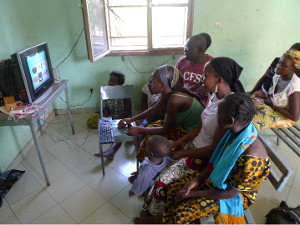
- Malinux Télé in a center helping teenage mothers (Bamako)
The Malinux Télé project involves the construction of smalls educational computers, which use an analog television as a screen. In Mali, those small computers are given to local non-profit organizations carrying out activities with disadvantaged malian children.
Malinux Télé devices embed a Raspbery Pi card and the Malinux Télé operating system, which is a fork of Raspbian specially designed for this project. It includes :![]() “classical” educational software like Tuxpaint, tuxtype, Tuxmath, Gcompris and JClic.
“classical” educational software like Tuxpaint, tuxtype, Tuxmath, Gcompris and JClic.![]() A copy of Vikidia (a wikipedia-like encyclopedia for children) and a copy of the pepit.be website (educational activities in flash).
A copy of Vikidia (a wikipedia-like encyclopedia for children) and a copy of the pepit.be website (educational activities in flash). ![]() Activities allowing children to practice reading in French (official language) and in bambarra (children’s mother tongue), made for needs of the project.
Activities allowing children to practice reading in French (official language) and in bambarra (children’s mother tongue), made for needs of the project.
All educational content is integrated onto the SD card, allowing the system to fully operate offline. The Malinux Télé operating system has also been adapted to allow correct display of the above software on a TV screen, to make its use as simple as possible, and to provide better longevity.
For more information about the project or to download the operating system, you can go to : https://download.tuxfamily.org/afrikalan/archive-malinux (french language)
Why use a Raspberry Pi board ? And why use a TV ?
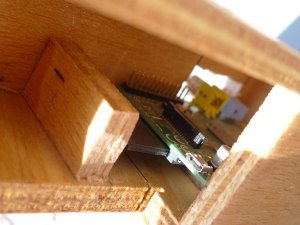
- A Raspberry Pi (model 1) mounted in the Malinuxc télé’s wooden box.
Beyond the low cost of such equipment, the use of Raspberry Pi wants to meet the challenge of bringing educational software where isn’t possible to bring computers.
In Mali, a computer is seen as far too precious to let the children use it, even if it has been donated. This is even more true for associations taking care or disadvantaged children in Mali. The TV is a more widespread device in Mali. Most childcare structures have a TV that children can use.
Also, 75% of Mali’s population is not connected to the power grid. A Raspberry Pi card and a small television consume little power and can be powered by other means, such as a solar panel.
Who is behind the Malinux Télé project ?
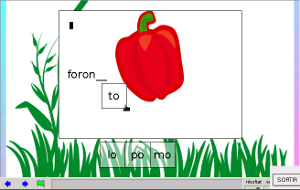
- Interactive activities to learn to read in the Bambara language, the mother tongue of Malian children.
The project is supported by the Bilou Toguna, a French association involved in international solidarity since 2002. Bilou Toguna lead actions in Mali in the areas of water, health, education and the environment. All it’s members act as volunteers and there are no operating costs : 100% of the donations are used for field actions. For more information about Bilou Toguna and its actions : http://www.biloutoguna.org (french language)
How to help ?
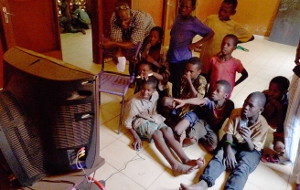
- Malinux TV, a center caring for street children.
Have some Raspberry Pi that no longer serve you ? They can make children happy in Mali ! Just ship them to us. Upon receiving, Bilou Toguna’s volunteers will take it to Mali, mount it in a nice wooden box, select serious local associations, and train them in the use of educational software so that they are best used with the children.
It’s usually possible to ship objects whose thickness does not exceed 3 cm as regular mail, allowing you to ship your Raspberry Pi for a reasonable price. (just check with your local post office).
You can also help by relaying this information to appropriate forums or blogs.
What kind of material can help ? To what address should I send it ?
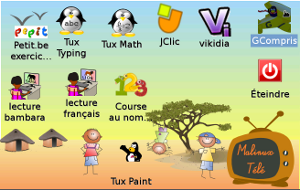
- Home screen of Malinux Télé.
The following materials will be useful to the project :![]() All models of Raspberry Pi cards.
All models of Raspberry Pi cards.![]() SD cards that no longer serve you (4GB capacity or more).
SD cards that no longer serve you (4GB capacity or more).![]() Banana Pi or any Allwinner processor based device. Malinux Télé has recently been ported to linux-sunxi (Allwinner A10 / A13 / A20 / A23).
Banana Pi or any Allwinner processor based device. Malinux Télé has recently been ported to linux-sunxi (Allwinner A10 / A13 / A20 / A23).
Note : the Raspberry Pi cases are not useful to the project because they are made in such a way that one can easily remove the SD card. This is something to avoid in order to prevent the SD card from ending up in the mobile phone of a child :-). Wooden boxes suitable for the project are made here in Mali by local artisans.
For sending, simply put your raspberry pi in its original carton or any other lightweight protection whose thickness does not exceeds 3cm, then put everything in an envelope addressed to :
Association Bilou Toguna
25 RUE HENRI MARTIN
31700 BLAGNAC
FRANCE
Who will benefit from your gift ?
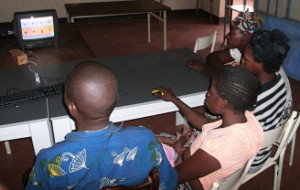
- Young mothers learnig alphabet.
The beneficiaries to whom Malinux Télé devices are given are all non-profit structures.
Malinux Télé devices are given to centres working with children "in difficulty" (street children, orphans, children who can’t live with their families for any reason), centres conducting edutainment activities with children in their local community, some libraries providing activities for children, and also some public schools.
For now on, 40 locals organisations caring for street children got a Malinux Télé device, and has been trained in the use of embedded educative software.
What is the Malinux Télé operating system made of ? Is it possible to download it and use it for other projects ?
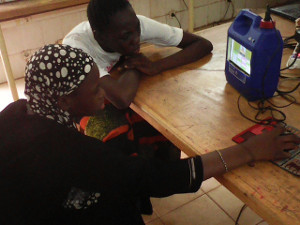
- A experimental model embedding a screen (chinese tablet), mounted in an old oil container.
The Malinux Télé operating system is derived from Raspbian. Scientific content has been removed and educational content suitable for children of Mali has been put in place (see above : “Malinux Télé, what’s this ?”). Various adjustments were made to meet the project requirements :![]() All applications run in full screen in order to optimize the small display space of a TV (656 x 416 pixels). However, the system can also work with HDMI display at greater resolutions.
All applications run in full screen in order to optimize the small display space of a TV (656 x 416 pixels). However, the system can also work with HDMI display at greater resolutions.![]() The filesystem in mounted in read-only mode : this improves longevity of the SD card and prevents the children from messing up the settings which may render the device unusable. A small Read/write partition is used to store children’s drawings.
The filesystem in mounted in read-only mode : this improves longevity of the SD card and prevents the children from messing up the settings which may render the device unusable. A small Read/write partition is used to store children’s drawings.![]() If no physical keyboard is connected, a virtual keyboard pops up when needed.
If no physical keyboard is connected, a virtual keyboard pops up when needed.![]() The applications are launched with a single click. A right click is considered is considered as a left click. This aim to make mouse manipulation simpler.
The applications are launched with a single click. A right click is considered is considered as a left click. This aim to make mouse manipulation simpler.![]() The System generates usage statistics, to help with evaluating the project.
The System generates usage statistics, to help with evaluating the project.![]() All embedded educational content works without internet connection.
All embedded educational content works without internet connection.![]() Children can play with there own photos on tuxpaint.
Children can play with there own photos on tuxpaint.
The Malinux Télé operating system can be freely downloaded, and anyone can reuse, translate or adapt in any way the work that was made for a completely different project.
The various adjustments made for the project mostly reside in the maliux* scripts located in /usr/bin. They are published under the terms of the GPL v3 licence.
If you want to make a project similar to Malinux Télé in another area, we can help you for adapting the system to fit your needs.
Feel free to contact us (download.tuxfamily.org/afrikalan/archive-malinux) if you have any question, remarks of if you just want to want to exchange with us.






